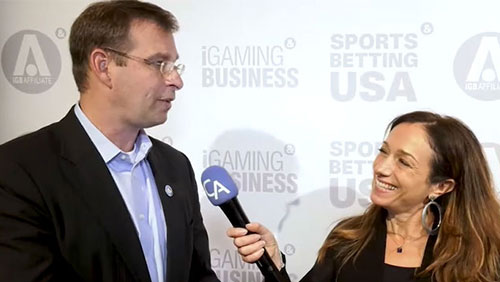As all types of gambling start to become more readily available in the U.S., those prone to gambling problems will need a more help too. National Council on Problem Gambling (NCPG) Executive Director Keith Whyte knows the size of the job, and he joined our Becky Liggero Fontana to talk about it.
There has been a lot of ink spilled in the U.K. about how easily accessible gambling is creating a bigger problem, but the truth is more complicated. “The rate of [overall] gambling problems in the U.K. is not increasing, but in the 18 to 24 young male heavily engaged betters, those problems are going up,” Whyte said. “So you know, what we’re learning is risk is split differently among the population, that most people you and I will be in very low risk for ever developing a gambling problem. But if you’re an 18 to 24 male who has a heavy history of existing illegal sports betting, when we shift you into the legal market you’re gonna be a much higher risk and those consequences are gonna fall on government and operators.”
The best way for the U.S. to learn from the U.K. is to see what they did right, and that means investing in problem gambling resources. “I think one of the biggest challenges is that we’re building, expanding sports betting now on a creaky infrastructure,” he said. “So there’s a lot of states that haven’t done anything, or have done very little with problem gambling, so the foundation is a little shaky and sports betting comes up some additional risk. Half the states that legalized it put new put new money into it, and that that’s what we recommended that makes a lot of sense because it’s new revenue. But the other half didn’t and so, you know we’re concerned we’re going to be picking up the pieces when gambling problems increase.”
Unfortunately, the money isn’t showing up just yet. “Here in the United States, we’re looking at an increase simply because we just haven’t put the money into it,” he said. “And so you know that’s a problem, in that backlash is going to rebound on the industry. Government’s not gonna blame themselves, they’re gonna blame the operators and the vendors. And so getting ahead of it, working with us to get ahead of stuff, you know is both ethical and economical.”
Liggero Fontana asked Whyte who is ultimately responsible for dealing with problem gambling. “It’s a great question because that’s what we’re often asked, you know, where the responsibility really lies,” he responded. “And it’s everybody, but you know someone has to take the lead and usually that’s where the money is. So in this case we would say, yeah, the operators and vendors. They’re monetizing this issue and so they should be putting some money back into it to make sure that they’re being covered. To make sure that the safety nets in place. We’ll provide that safety net, but you’ve gotta, you know, the money has to come from somewhere, and so I think it’s their responsibility but it’s the league’s responsibility too. And right now they’re not really sure that they’ve accepted that yet. They’re not really sure that even getting a lot, you know billions of dollars in new revenue means that they have any responsibility for the downside. And I think the public and everyone else agrees that they you can’t have it both ways.”
The NCPG is trying to do their part, but they need more buy-in from all parties involved. “So you know we’ve had a set of internet responsible gambling centered since 2012, but most operators and vendors have chosen not to be certified against them,” he said. “So we believe technology can be really protective but you have to actually do it intentionally, and unfortunately most people are waiting to be regulated and they’re gonna be regulated a lot worse than voluntarily getting ahead of things. Again we’re pro technology, but you we have to have partners to really make it happen and you know the potentials there.”
The last thing Whyte wants is for the NCPG to be viewed as taking a side, because it’s only looking to help. “Well we’re nonprofit, we receive no government funding, so we’re 100 percent membership funded,” he said. “We’ve been in neutral on legalized gambling since 1972, our door is always open and you know we invite people to come and see what we can do, because we can be helpful but only when people want to work with us. We’ve got a long history of being very productive, of being very solution focused, so if you’re interested in responsible solutions, we’re happy to help, but we can’t we can’t make someone do it you.”
